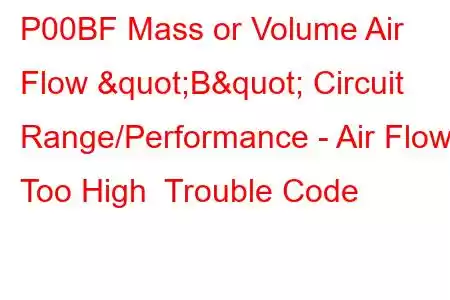P00BF MAF "B" Circuit Range/Performance Flow Too High
Technical Description
P00BF Mass or Volume Air Flow "B" Circuit Range/Performance - Air Flow Too High
What does that mean?
This diagnostic trouble code (DTC) is a generic powertrain code, which means that it applies to OBD-II equipped vehicles with a Mass or Volume Air Flow sensor (BMW, Ford, Mazda, Jaguar, Mini, Land Rover, etc.). Although generic, the specific repair steps may vary depending on year, make, model, and/or powertrain.
The mass air flow (MAF) sensor is a sensor mounted in a vehicle's engine air intake tract downstream from the air filter, and is used to measure the volume and density of air being drawn into the engine. The MAF sensor itself only measures a portion of the air entering and that value is used to calculate the total volume and density of air being ingested. The MAF may also be called a Volume Air Flow sensor.
The powertrain control module (PCM) uses that reading along with other sensor parameters to ensure proper fuel delivery at any given time for optimum power and fuel efficiency.
Basically this P00BF diagnostic trouble code (DTC) means that there is a problem with the Mass or Volume Air Flow (MAF) "B" sensor circuit. The PCM detects that the actual MAF sensor frequency signal is not within a predetermined expected range of the calculated MAF value, and in this case it's determined that the air flow is too high.
Note the "B" part of this code description. That letter denotes either part of the sensor or circuit, or even a single MAF sensor if the vehicle has more than one.
Note: Some MAF sensors also incorporate an air temperature sensor, which is another value used by the PCM for optimal engine operation.
Photo of a MAF sensor:
Symptoms
Symptoms of a P00BF code may include:
Malfunction indicator lamp (MIL) illumination (a.k.a. check engine light) Engine running rough Black smoke from tail pipe Stalling Engine hard start or stalling after it starts Possible other driveability symptomsPossible P00BF Causes
Potential causes for this trouble code may include:
Dirty or contaminated mass air flow sensor Failed MAF sensor Intake air leaks MAF sensor electrical harness or wiring problem (open, shorted, frayed, poor connection, etc.)Note that other codes may be present if you have a P00BF. You may have misfire codes or O2 sensor codes, so it's important to take a "big picture" look at how the systems work together and effect each other when doing a diagnosis.
Diagnostic Steps & Possible Solutions
The best first steps for this P00BF diagnostic code are to check for Technical Service Bulletins (TSBs) that apply to your year/make/model/engine, and then do a visual inspection of the wiring and system components.
Possible diagnostic and repair steps include:
Visually inspect all MAF sensor wiring and connectors to make sure they are intact, not frayed, broken, routed too close to ignition wires/coils, relays, motors, etc. Visually inspect for any obvious air leaks in the air intake system Visually *closely* inspect the MAF sensor wires or film to see if you can see contamination such as dirt, dust, oil, etc. If the air filter is dirty, replace it Carefully clean the MAF using MAF cleaner spray is generally a good DIY friendly diagnostic/repair step If the air intake system has a mesh in it, make sure that is also clean (VWs mainly) Loss of vacuum to the MAP sensor can trigger this DTC A low minimum air rate through the sensor bore may cause this DTC to set at idle or during deceleration. Inspect for any vacuum leaks downstream of the MAF sensor. Use a scan tool to monitor real-time sensor values from the MAF sensor, O2 sensors, etc. The barometric pressure (BARO) that is used in order to calculate the predicted MAF value is initially based on the MAP sensor at key ON. A high resistance on the ground circuit of the MAP sensor can cause this DTC to set Do an exhaust backpressure test to determine if the catalytic converter may be cloggedIf you do need to replace the MAF sensor, we recommend using an original equipment OEM one from the manufacturer rather than buying an aftermarket part.
Read: 56


